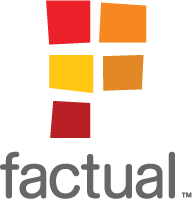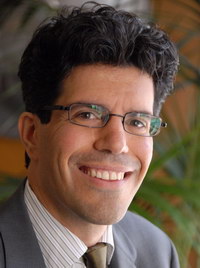Thursday, December 9, 2010
Gil Elbaz On Factual's New Warchest

Last night, Santa Monica-based Factual (www.factual.com), the data provider and data tools firm, announced a big, $25M funding round from Andreessen Horowitz and Index Ventures. The firm is headed by Gil Elbaz, who is known for co-founding Applied Semantics, the firm which invented Google's AdSense product. We caught up with Gil to hear more about the round and what he's hoping to do with the large amount of capital Factual has just raised, as well as how the firm's technology is being used by such companies as Facebook for their local information.
Gil, thanks for the time today. This is a pretty big round and is a lot of funding--what are you using it for?

Gil Elbaz: Yes, it's a big round, but we have a very ambitious vision, which requires lots of work to execute on. That very big vision is an open database platform, providing data as a service across different verticals. I've excited about the particular investors involved, Andreessen Horowitz and Index Ventures, both of which understand there are emerging categories such as data-as-a-service, which can become very large as you dig into various verticals. We're doing well in local, even though we only announced the offering in September, and things are picking up and getting traction. In order to execute in other verticals, we want to bring in a lot more talent, hiring more engineering talent to bolster our core platform, which does a lot.
Talk about local, and where you're seeing the most usage of your APIs/datasets?
Gil Elbaz: The primary developer demographic for our products is people building web and mobile applications. They're most interested in the place database we're offering. That database includes businesses, points of interest, and contact information such as phone and address, as well as category and latitude and longitude. That dataset is of interest to anyone with a location aware service. As you know, that's a very fast growing category, particularly in mobile, with interest in things such as proximity searches, and finding businesses near you for check-ins.
What are the biggest data and computation challenges you are dealing with?
Gil Elbaz: The way we do things, we are assimilating millions of sources of information into one, aggregated database. Those sources can be an end user directly, through crowdsourcing, or it can be based on a partnership--where we're working with partners who are providing us with data from crowdsourced or other sources. That data can also be via web crawls, where we are applying natural language, machine learning, and other techniques to extract or validate facts from web pages. In order to assimilate and aggregate that information, it requires a high degree of data cleaning and resolution, which you might also know as de-duping. We've got to look for all the records which point to the same businesses, even though they might point to slightly different addresses, or might have an error, or there might be multiple ways to write a businesses' name, or because there might be different phone numbers for that business. That require lots of cleaning an de-duping technology in order to use those billions of source records, and put them into a nice place database. In the case of the U.S., we've folded that into a 14 million row database of validated facts.
Talk about how Facebook is using your data?
Gil Elbaz: A few weeks ago, we did a blog post about companies using our local data, including Facebook Places. We specifically announced they are using data for the UK and Japan. It's indicative of the general traction and interest we see in the local data, and reflects the degree to which maintaining, finding, and curing this sort of data is very expensive. Facebook looked at us to help with that problem.
So, with funding in hand, what are your particular goals in the next few months?
Gil Elbaz: We're aggressively hiring top engineering talent in scalable data processing, people with backgrounds in machine learning and natural language technologies. In a couple of weeks, we're moving to a larger office on the west side, in Century City, which will give us space for more people. We're also hiring in our Shanghai office, and soon will open up a Silicon Valley office, which will be an engineering hub.
Thanks for the time!